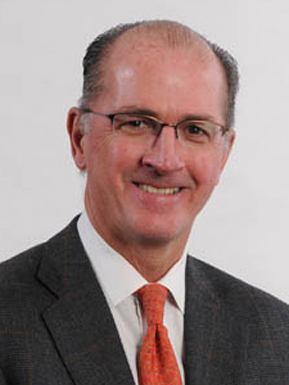Facing Death, COM Professor Kept On Living
Peter Morrissey’s final lesson

After undergoing surgery for brain cancer, Peter Morrissey insisted that disease not derail his life. Although the operation left his vision occasionally impaired, he went jogging and once tripped over an object that blindsided him, gashing his knee. As colleague Stephen Quigley (SED’87), a College of Communication associate professor, recalls the story, “A passing driver saw Peter sprawled on the side of the road bleeding and stopped to help.” Morrissey assured the driver, “‘Everything’s fine. You should see the other guy.’”
Morrissey kept his pluck even in his last week, when he told his wife that he “had had a great life,” COM Dean Thomas Fiedler (COM’71) says. “Even after he received his diagnosis last year, his comment to her was, ‘How lucky we have been.’”
An associate professor of public relations, Morrissey (COM’87) amassed professional accomplishments, but it was the intellect and personality behind them that most impressed friends and family before he died August 3 at age 59, leaving his wife and three children. Facing an impending death that medicine couldn’t avert, he fought back with the only weapons left to him: humor and a gratitude for the accumulated blessings of almost six decades. In his life’s finale, the teacher found a teachable moment, his last lesson a luminous, outside-the-class moral he’d urged on corporate clients: meet catastrophe with honesty, and grace.
Before joining COM’s full-time faculty in 2006, Morrissey was a public relations executive advising blue-chip companies on big-league matters. In 1999, he started his own firm, Morrissey & Co., providing media relations, reputation management, and crisis communications for clients worldwide. It was the third start-up in a career counseling the likes of IBM, Miller Brewing Co., and Johnson & Johnson, the latter during the infamous 1982 Tylenol murders. An anonymous killer, never found, poisoned seven people with tainted Tylenol capsules in a case that became a model of corporate candor during crisis. PRWeek magazine named Morrissey one of the country’s leading communication counselors in 2004, a man “who should be on the speed dial in a crisis.”
The Tylenol episode demonstrated his approach to his job. Aimee Charest (COM’06), his assistant at Morrissey & Co., says he had three suggested criteria before speaking: “‘Is it necessary I say it? Is what I say the truth, and lastly, is what I’m about to say kind? Try to meet at least two of the criteria—all three if possible.’ Peter had no problem meeting these criteria.”
About a month before his death, Morrissey sent a card to colleague Edward Downes, a COM associate professor. “He referenced Ignatius of Loyola, talked about the ‘bliss of life,’ acknowledged his wife and kids, and never came within a million miles of complaining. Just gratitude—class, really—was what he shared,” says Downes. “He could reference the classic philosophers in the same sentence in which he referenced new media’s influence on public relations. But more admirable was his social intelligence. He could read people well.”
Or teach them to read others. Fiedler recalls his first encounter with Morrissey, shortly after he was appointed dean four years ago. Morrissey had deployed his class on COM’s lawn, lining up pairs of students, each standing in front of a partner, and instructing those in front to collapse backwards, relying on their partner to catch them. “Peter told me that it was an exercise designed to teach the importance of trust among team members, something he said would be critically important to their success in later careers.”
“He epitomized the COM model of practitioner-scholar, the person who not only maintains a successful career as a communication professional, but brings that knowledge into the classroom,” the dean says. Fiedler says that Morrissey’s wife Carey told him that nothing gave Morrissey “greater pleasure…than talking with students, or hearing back from graduates that his classes had been major influences on their careers.”
Morrissey’s pre-COM career “blended splendidly not only with the practitioner accomplishments of some of his BU public relations faculty colleagues, but also with those of us from the more scholarly side of the academy,” says Donald K. Wright, Harold Burson Chair of COM’s mass communication, advertising, and public relations department. “He was a prolific reader…and he was a real class act.”
As a board member of the Boston Athletic Association, Morrissey helped oversee the BAA’s main event, the Boston Marathon, which he also ran several times, according to Fiedler. He was also a member and former chairman of Morgan Memorial Goodwill Industries in Boston.
The Morrissey family will hold a memorial service Monday, September 10, at 10 a.m. at the St. Ignatius of Loyola Church at Boston College in Chestnut Hill. In lieu of flowers, donations in his memory may be made to Goodwill Industries.
Comments & Discussion
Boston University moderates comments to facilitate an informed, substantive, civil conversation. Abusive, profane, self-promotional, misleading, incoherent or off-topic comments will be rejected. Moderators are staffed during regular business hours (EST) and can only accept comments written in English. Statistics or facts must include a citation or a link to the citation.